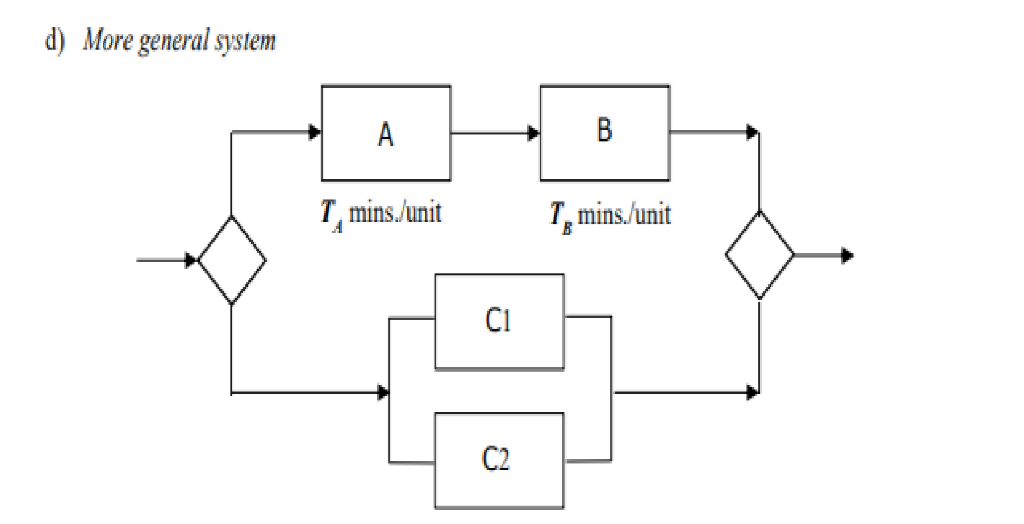Question
More general system Each entering flow unit first splits into two parts the first part goes through stages A and B, and the second part
- More general system

Each entering flow unit first splits into two parts the first part goes through stages A and B, and the second part is processed concurrently through stage C. E.g., in a doctors office, one piece is the patient, and the other part is the paperwork (e.g., billing) for this patient. When the processing for both parts is completed, the two parts of the flow unit are re-assembled, and the unit leaves the system.
-- What is system capacity if processing times at stages A, B, C are respectively a, b, andc minutes/flow unit (per server, at stage C)?
Spreadsheet model for more general system
- Develop a spreadsheet to calculate the capacity for the more general system of part (d). Given specific values for the parameters a, b, andc plus other parameters you may define (these are the inputs to the model), the spreadsheet needs to calculate (based on your model of part (d)) and report the capacity of the system (the output) in units per hour. Be sure to design the spreadsheet so that it is self-explanatory and anyone who is familiar with this process flow diagram (but not your spreadsheet) can use it. For example, you should clearly specify, via descriptive labels, the intended content of the cells where the input information needs to be entered, and the output value is displayed. Be sure to specify the units of measurement for each input and output value.
- Using this spreadsheet, compute the capacity of the system for the processing time values shown in the following table:
| Parameter | value |
| Ta | 7 mins/unit |
| Tb | 8 mins/unit |
| Tc | 26 mins/unit |
- Suppose the firm that operates this system has unlimited demand, i.e., it can process as many units as its capacity permits (fractional values are permitted). Suppose each unit of demand yields a profit contribution of $ 20 per unit. The firm operates 40 hours per week. What is its weekly profit contribution?
- Currently, the firm has two machines, one each in station C1 and C2, that perform operation C in parallel. The firm is wondering if it would be profitable to lease additional machines to operate in parallel at stage C. Leasing such a machine costs $ 800 per week (per machine). Should the firm lease any additional machines, and if so how many should it lease to maximize its profits (net of the leasing costs for the additional machines)?
Hint: In your spreadsheet, add a parameter for the number of machines in stage C, say, . Express the system capacity in terms of , compute weekly profit for various values of , and select the best (profit maximizing) value.
- Would your answer to the previous question (part (iv)) change if the firm works for 60 hours per week instead of 40 hours per week (profit contribution per unit remains at $ 800 per unit)? Explain.
Step by Step Solution
There are 3 Steps involved in it
Step: 1

Get Instant Access to Expert-Tailored Solutions
See step-by-step solutions with expert insights and AI powered tools for academic success
Step: 2

Step: 3

Ace Your Homework with AI
Get the answers you need in no time with our AI-driven, step-by-step assistance
Get Started


